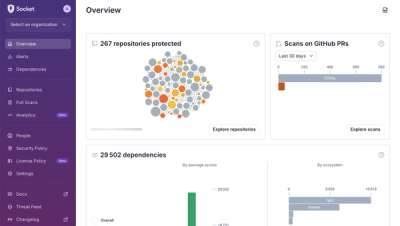
Research
wget to Wipeout: Malicious Go Modules Fetch Destructive Payload
Socket's research uncovers three dangerous Go modules that contain obfuscated disk-wiping malware, threatening complete data loss.
.. image:: https://github.com/TyMaszWeb/django-cookie-law/workflows/build/badge.svg :target: https://github.com/TyMaszWeb/django-cookie-law/actions
django-cookie-law will display a dismissable banner, making your users aware of cookies being used.
.. warning:: This app is known to be not complaint with the United Kingdom PECR/GDPR.
It is your responsibility to find out whether django-cookie-law meets the specific local legal requirements.
Contributions and comments are welcome using Github at: http://github.com/TyMaszWeb/django-cookie-law
Please note that django-cookie-law requires:
#. pip install django-cookie-law
#. Add 'cookielaw' to INSTALLED_APPS
#. Run collectstatic (Django 1.3+) or copy the statics to your media directory
#. Add cookielaw/js/cookielaw.js to the markup directly or via your asset
manager such as django-pipeline or django-compressor
#. If you're using Django > 1.8, enable 'django.core.context_processors.request' in your TEMPLATES['OPTIONS'] setting, eg.:
::
TEMPLATES = [
{
'BACKEND': 'django.template.backends.django.DjangoTemplates',
'DIRS': [],
'APP_DIRS': True,
'OPTIONS': {
'context_processors': [
'django.template.context_processors.debug',
'django.core.context_processors.i18n',
'django.core.context_processors.media',
'django.template.context_processors.request',
'django.contrib.auth.context_processors.auth',
'django.core.context_processors.static',
'django.core.context_processors.tz',
'django.contrib.messages.context_processors.messages',
],
},
},
]
If you're using an older version of Django (< 1.8) then you'll want to change the
TEMPLATE_CONTEXT_PROCESSORS setting, eg.:
::
TEMPLATE_CONTEXT_PROCESSORS = (
'django.contrib.auth.context_processors.auth',
'django.core.context_processors.debug',
'django.core.context_processors.i18n',
'django.core.context_processors.media',
'django.core.context_processors.request',
'django.core.context_processors.static',
'django.core.context_processors.tz',
'django.contrib.messages.context_processors.messages'
)
.. note:: N.b. versions below 1.8 are not officially supported.
.. note:: If you don't have this setting defined, just add it to your settings module.
#. {% load cookielaw_tags %} and add {% cookielaw_banner %} template
tag where you want to display the cookielaw banner. Best place for this is
your 'base' template, so you will have the cookie banner on every page of
your website.
If you want to use our default template, add cookielaw/css/cookielaw.css to
the markup and you should see the cookie law banner at the top of the page until
you dismiss it with the button in the top-right. This CSS is Twitter Bootstrap
compatible, but chances are, you'll like to adjust it anyway.
To change the markup, just add a template named cookielaw/banner.html and
make sure it is loaded before the default template (for example put the
django.template.loaders.filesystem.Loader before
django.template.loaders.app_directories.Loader and add your new template
to any of the TEMPLATE_DIRS).
To change the CSS, just write your own rules and don't include the default stylesheet.
If you want your visitors to be able to reject the cookies, you should setup
cookielaw context processor by adding it to TEMPLATE_CONTEXT_PROCESSORS
like this:
::
TEMPLATE_CONTEXT_PROCESSORS = (
...
'cookielaw.context_processors.cookielaw'
)
That will add cookielaw context variable to the template context. That
variable is a dict with 3 keys: notset, accepted and rejected, each
with true or false value.
Instead of default banner.html template, use rejectable.html one which
shows an example of how to reject the cookies (of course, you may change the
template to suit your own needs, just take care that you have
<div id="CookielawBanner"> container.
In your templates, you can choose to display the banner only for new visitors (case when cookie is not set):
::
{% load cookielaw_tags %}
{% if cookielaw.notset %}{% rejectable_cookielaw_banner %}{% endif %}
Of course, you may use {% cookielaw_banner %} as well.
Once the visitors accepts or rejects the cookies, you may choose to load or not load the analytics trackers:
::
{% if cookielaw.accepted %}
... the code to load tracker ...
{% endif %}
Please use Github to report bugs, feature requests and submit your code: http://github.com/TyMaszWeb/django-cookie-law
:author: Piotr Kilczuk :date: 2013/04/08
FAQs
Did you know?

Socket for GitHub automatically highlights issues in each pull request and monitors the health of all your open source dependencies. Discover the contents of your packages and block harmful activity before you install or update your dependencies.

Research
Socket's research uncovers three dangerous Go modules that contain obfuscated disk-wiping malware, threatening complete data loss.

Research
Socket uncovers malicious packages on PyPI using Gmail's SMTP protocol for command and control (C2) to exfiltrate data and execute commands.

Product
We redesigned Socket's first logged-in page to display rich and insightful visualizations about your repositories protected against supply chain threats.